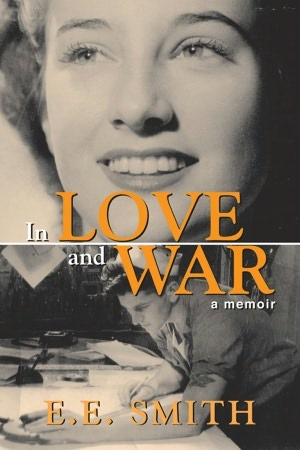
In Love and War
“Was this perhaps the inescapable role of women in wartime, to be swept up in the drama, and yes, even the glamour of war?” This question haunts E.E. Smith’s memoir as she reflects on her life and the choices she made in love, decisions impacted by the realities of the Korean War.
Smith uses her life story as a springboard for considering the politics of war. She ponders, too, how cultural events shape our personal life decisions. But mostly, she uses her experiences as a young bride during the Korean War to explore what happens when relationships, and marriages, happen too quickly—perhaps swept up in the momentum of romance, perhaps driven by outside pressures.
Smith shares meeting her “rebel” husband, Johnny, during the Korean War. Just as they enter the early, passionate stage of their relationship, but before it can be fully explored, Johnny is shipped off to Korea. Caught up in wartime romance, they marry quickly. While he’s gone, she continues her career. Smith describes her various work experiences, which offer fascinating insights into the lives of professional women during the nineteen-fifties, sixties, and seventies. Yet her biggest role was supporting her husband as he returned, completed college, and earned his doctorate. The author describes the marriage, its struggles, and her eventual divorce. She also tells how she found love again, and, while a rocky relationship in its own right, how it changed her life.
An award-winning playwright, Smith draws you into her story with writing that is personal and clean, with lots of effective dialogue. And she opens each chapter with a short description of socio-political happenings concurrent with her story, enriching her memoir with a larger context.
However, while she seems well focused in the beginning of the book on revealing how cultural events impact our life choices, she loses that focus halfway through. Perhaps because she hurries through the later years. Or she may be keeping that part of the story closer for her own catharsis.
Nevertheless, the autobiography is worthwhile for those interested in wartime romances. It’s also especially suited for anyone fascinated by war’s impact on the homefront or by the lives of women during that time. And in the end, the reader is left to ask, along with Smith, “Are we [women] doomed to make bad judgments—bad marriages—while driven to act impulsively in the fear that tomorrow may be too late?”
Reviewed by
Diane Gardner
Disclosure: This article is not an endorsement, but a review. The publisher of this book provided free copies of the book and paid a small fee to have their book reviewed by a professional reviewer. Foreword Reviews and Clarion Reviews make no guarantee that the publisher will receive a positive review. Foreword Magazine, Inc. is disclosing this in accordance with the Federal Trade Commission’s 16 CFR, Part 255.
